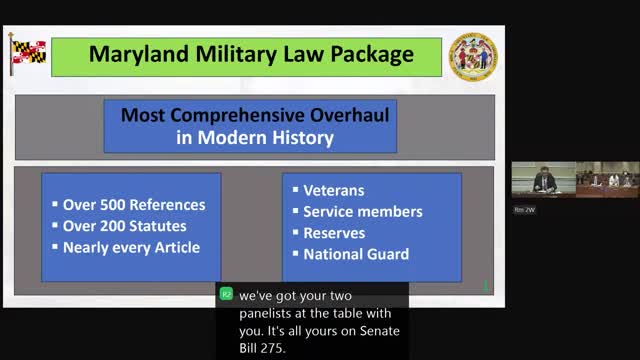Senate Bill 275 would centralize, modernize Maryland military law to cover all eight uniformed services
Get AI-powered insights, summaries, and transcripts
Subscribe
Summary
Senate Bill 275, presented by Sen. Brian Simonaire, would centralize and modernize Maryland's military laws by standardizing definitions across articles and updating terms to cover all eight uniformed services.
Senator Brian Simonaire introduced Senate Bill 275 to the Education, Energy, and the Environment Committee, saying the measure would modernize Maryland's military laws by centralizing definitions and bringing terminology in line with federal standards.
Supporters told the committee the bill would remove inconsistent and duplicate definitions that currently appear across state law and create a single, centralized article that other statutes could reference for baseline definitions.
The problem SB 275 seeks to address is widespread, Simonaire said: "We're updating over 500 references, approximately 230 sections, nearly every article, dealing with our veterans, service members, reserves, and national guard." He said the package is intended to preserve underlying policy while making treatment consistent among all service members.
Why it matters: Committee members and witness organizations said inconsistent statutory language creates confusion for service members seeking benefits and complicates future updates. Simonaire said standardizing statutory terms will simplify future revisions (for example, adding the Space Force once in one place rather than across many articles) and improve alignment with federal agencies.
Witnesses: Joseph Bridal, representing the American Legion posts in Maryland, testified that SB 275 ‘‘is a critical step forward in aligning Maryland's laws with the federal standards’’ and urged favorable consideration. David (Dave) Dragic, legislative director for the Maryland Military Coalition and a retired Army colonel, said the coalition strongly supports modernizing the code and requested an amendment to ensure PHS and NOAA members keep the same rights and benefits as other uniformed-service veterans.
Key provisions and clarifications discussed in the hearing: - Standardize Maryland definitions to match federal definitions (witnesses referenced 38 U.S.C. § 101 during questioning). - Centralize definitions in a single general-provisions location so other articles reference that source. - Modernize terminology (for example, replace “military ID” with “uniform services ID” to include all eight branches). - Explicitly authorize the Department of Veterans and Military Families to support service members (not just veterans), codifying duties supporters said already exist in mission statements.
Committee questions and points of emphasis included whether the bill would alter existing eligibility standards for veteran benefits. Simonaire and witnesses repeatedly said the package’s intent is not to change underlying policy but to standardize terms and structure; however, they acknowledged a few technical amendments were under discussion to address concerns raised by the Joint Veterans’ Commission and the department.
Next steps and outlook: Simonaire said SB 275 is the structural centerpiece of an eight‑bill package that will be distributed among relevant standing committees. He also said House sponsors are working in bipartisan fashion to align companion measures. Simonaire and witnesses said they expected to negotiate several technical amendments before final committee votes.
Ending: Supporters characterized SB 275 as a large, technical clean-up intended to reduce confusion and make future statutory updates simpler; opponents did not offer a formal unfavorable position in the hearing record on this bill.
